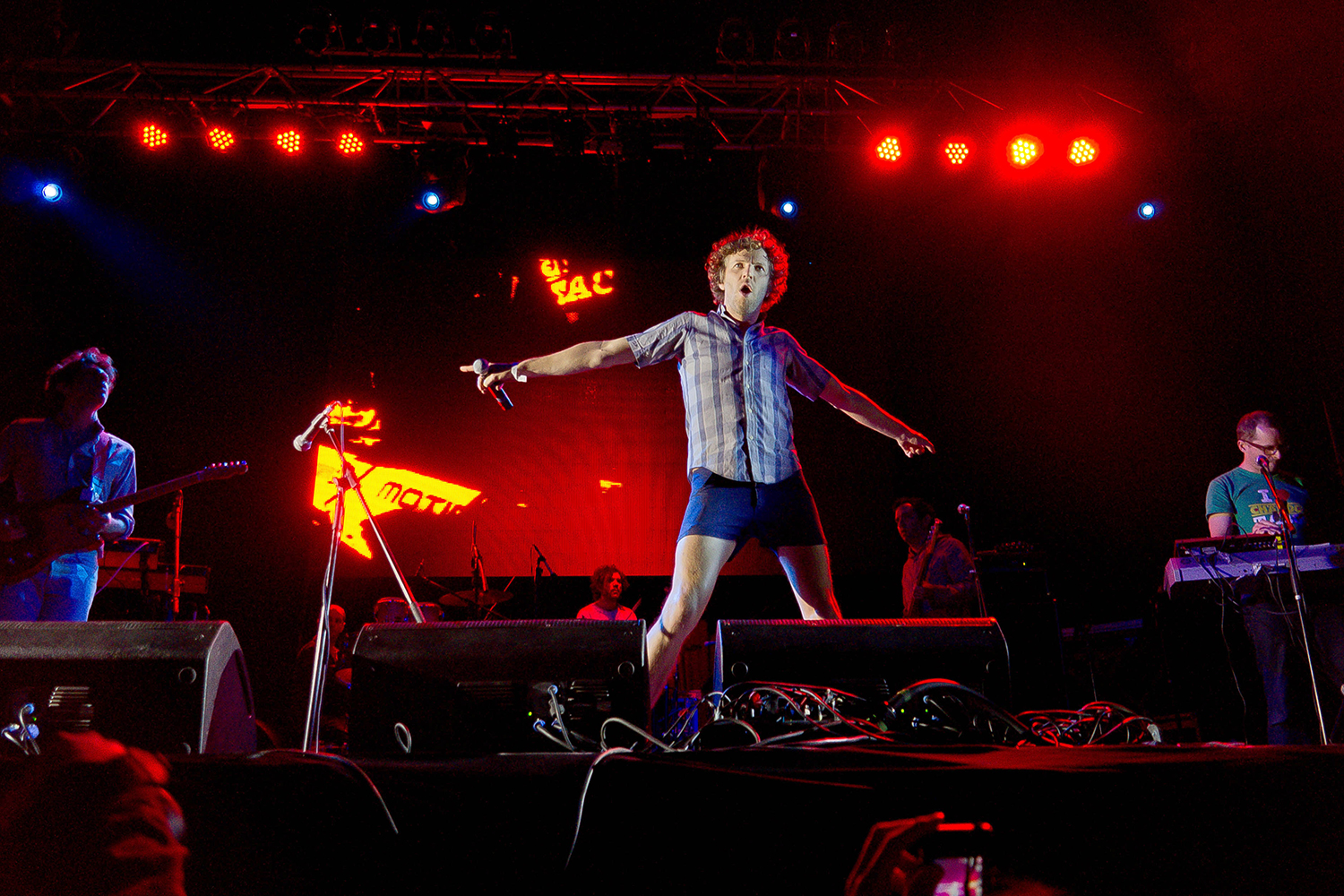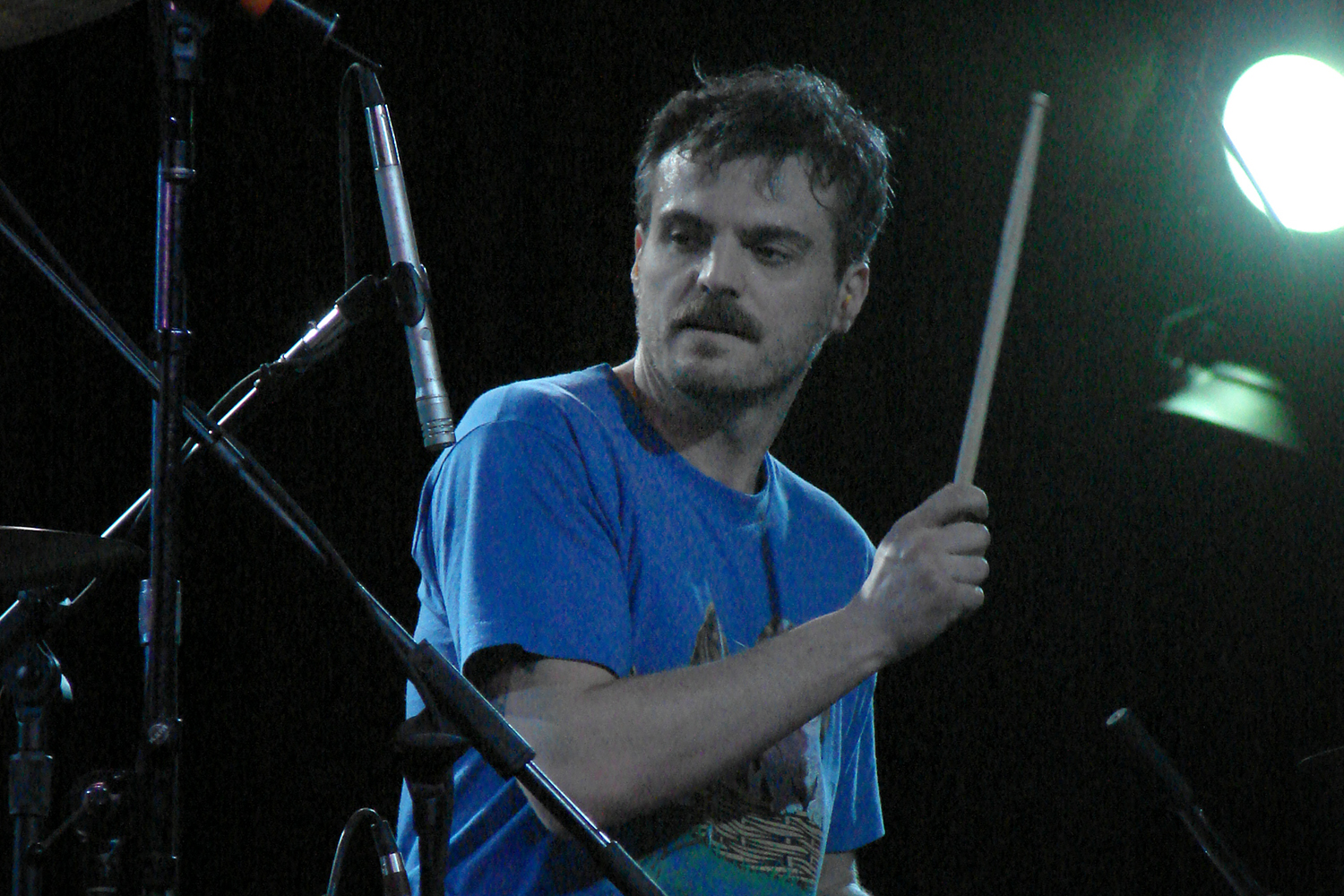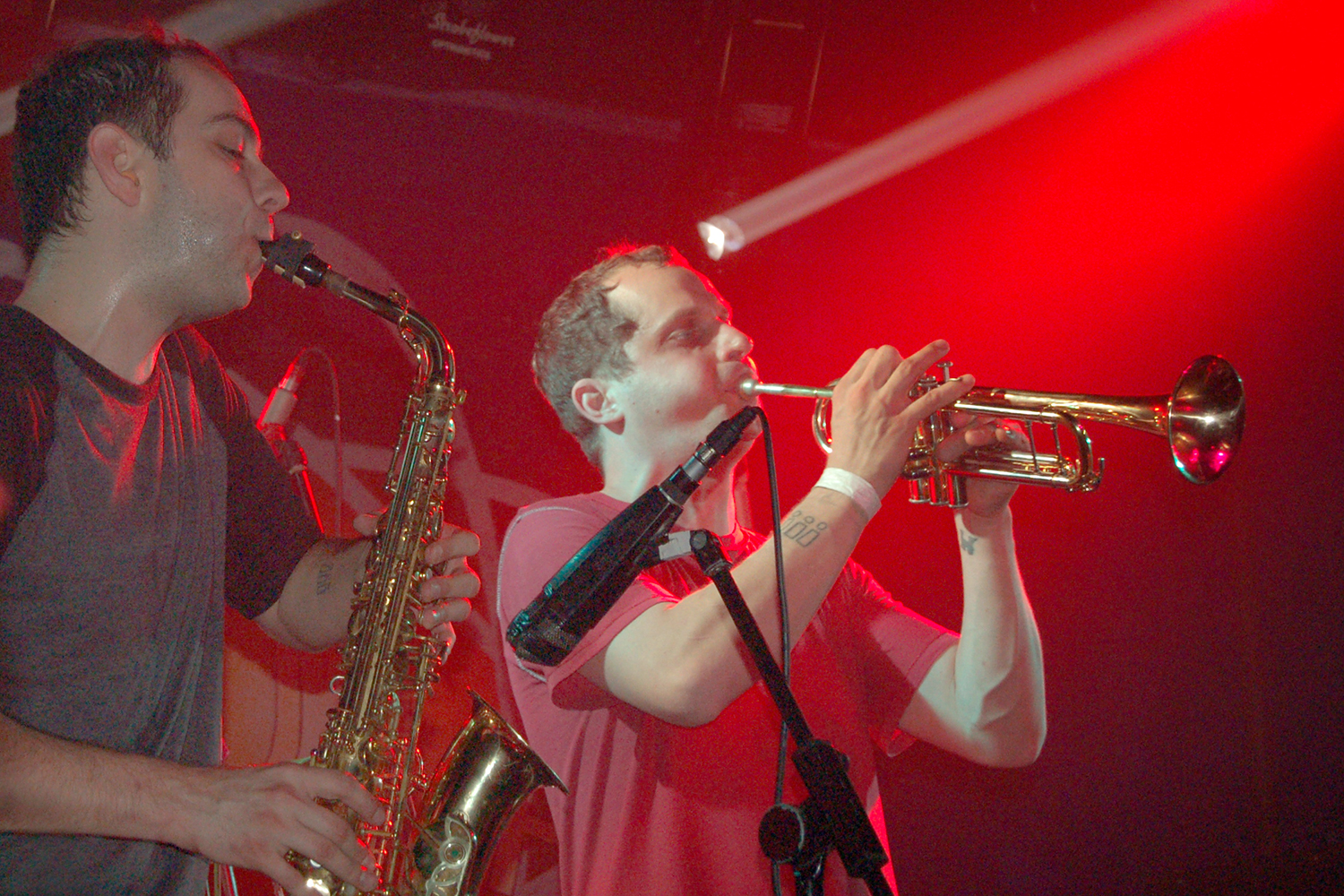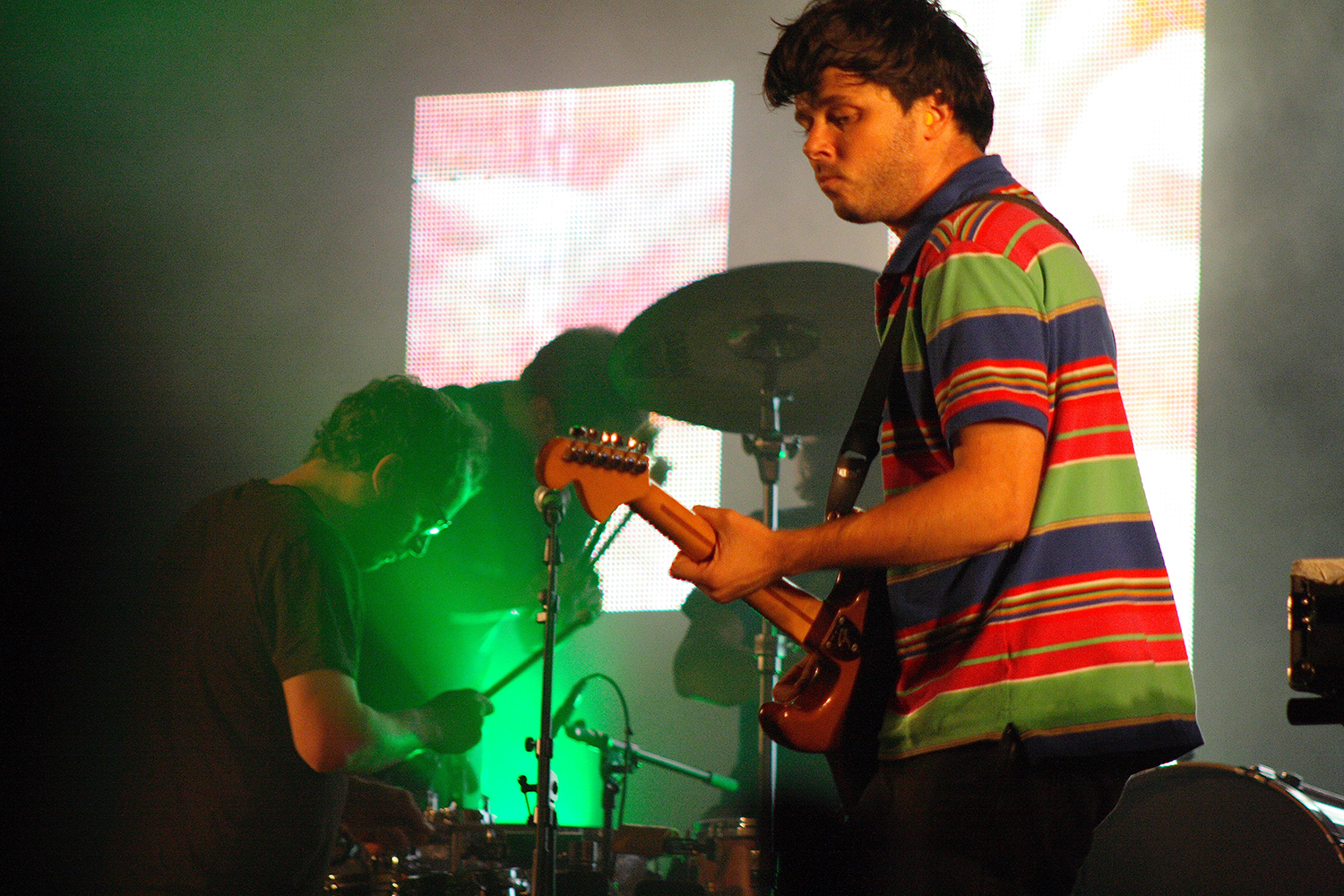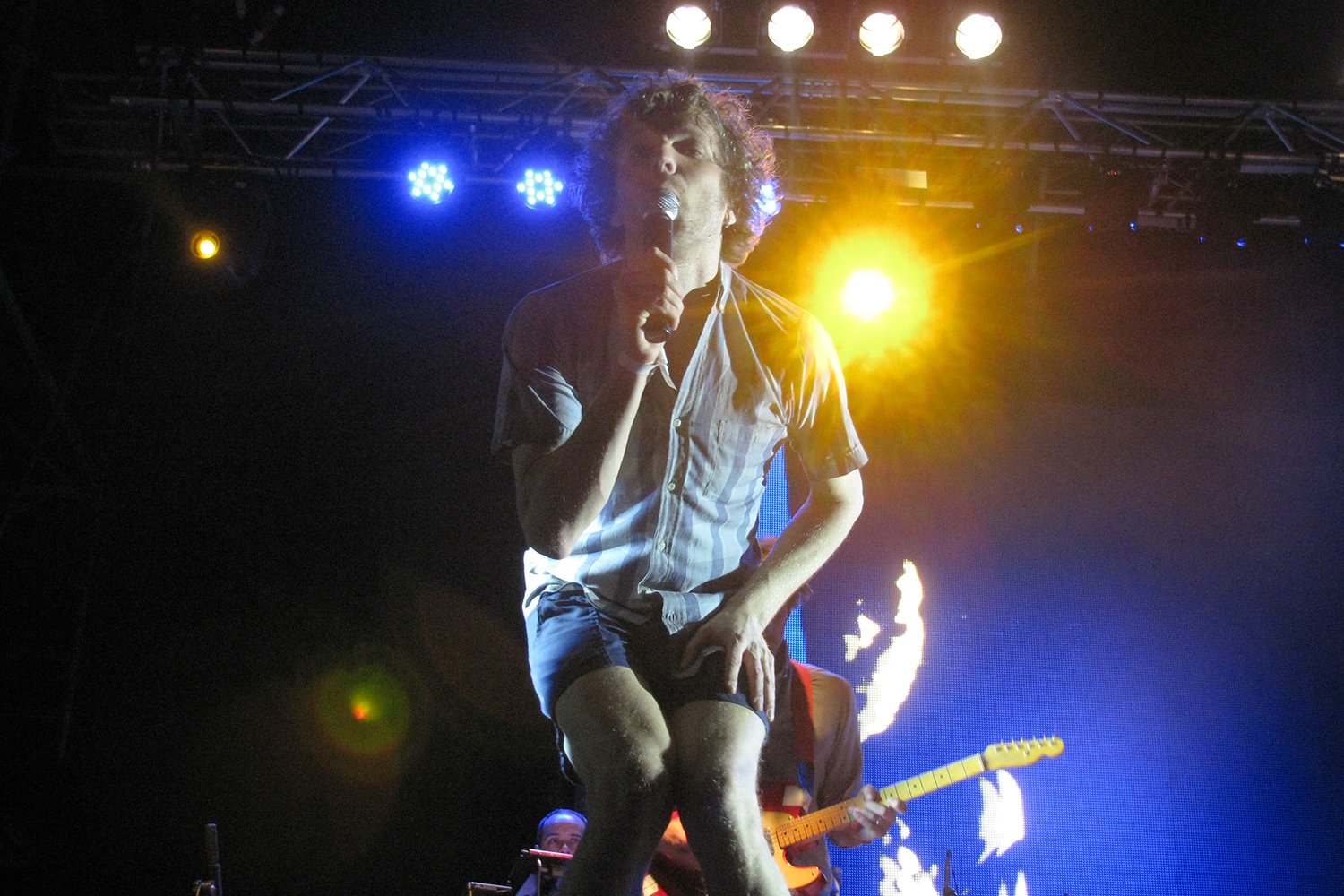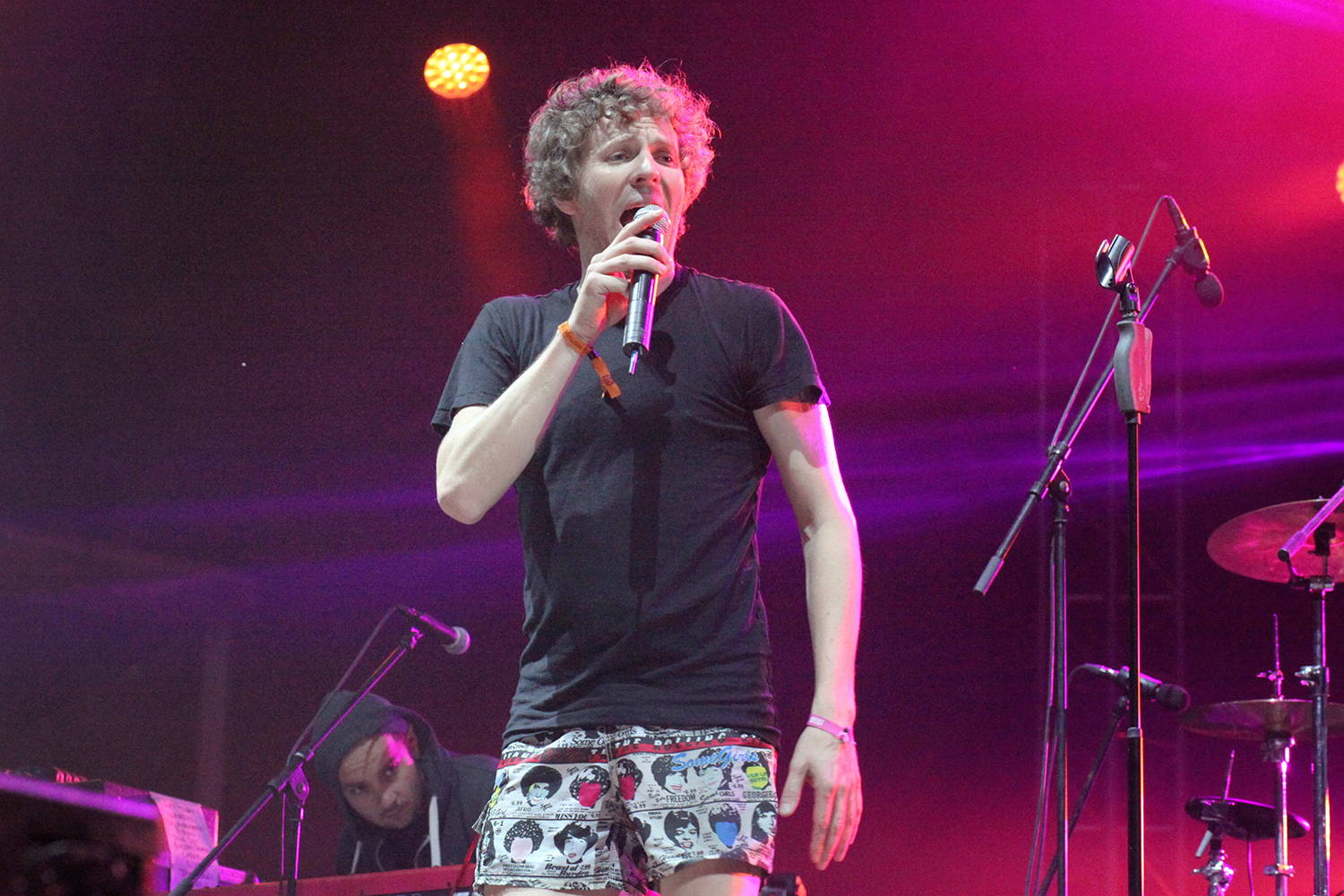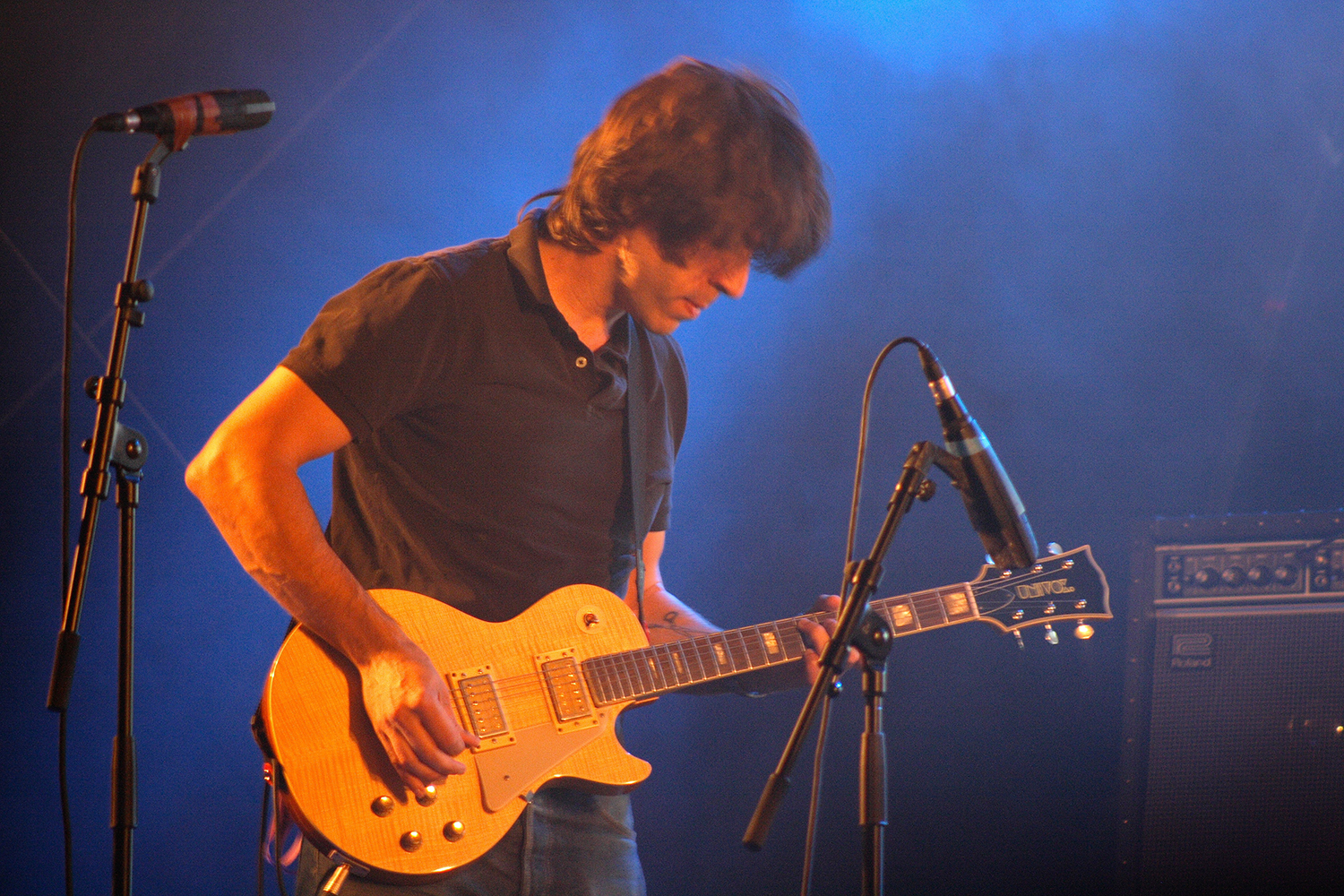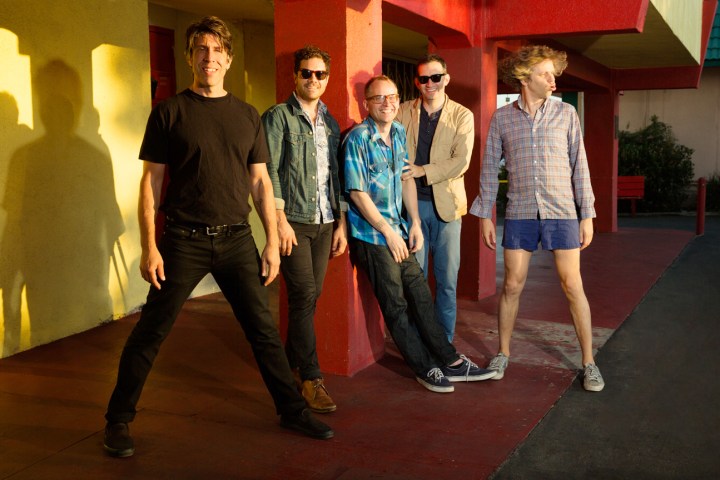
“You try to do as many different things as you can, because they all have a slightly different character.”
Genre mixing can be a beautiful thing when it’s done right, as witnessed by the blissful sounds made by the Brooklyn-based jam-punk/indie-dance hybrid collective known as !!! (pronounced Chk Chk Chk). On their new album As If, out now on various formats via Warp Records, !!! veers from the funky call to arms, er, pencils on All U Writers, to the percussive slam of Ooo to the travelogue grit of Bam City.
“We tried to keep it playful enough that we’d even try some things with plug-ins where we didn’t know what we were doing to see what sounded cool and what didn’t,” explains !!! vocalist/keyboardist Nic Offer. “We also wanted to magnify the live sound. A lot of stuff on here we tried to do completely computer-oriented, because those are the kind of dance tracks that we like. But when it was the band playing, then we really wanted to magnify that aspect of it. When it’s a live band, it’s very live. And when it’s a computer, it’s very computer.”
Digital Trends called Offer while he was on playground duty in Brooklyn to discuss how and when to manipulate vocals (or not), what he listens to the most on Spotify, and why he’s done with revisiting punk.
Digital Trends: I was thinking we may have to change the band name for this record to Chic Chic Chic, because it seems like there are a lot of Nile Rodgers-approved grooves here.
Nic Offer: (laughs heartily) Yeah, yeah, that was what we were trying to get to, definitely. I felt we kind of hit it close on the last record (2013’s THR!!!ER), but, yeah, he’s certainly always an influence.
Tell me about the gear and the plug-ins you were using on this record.
Oh, let’s see. Mario (Andreoni, guitarist/keyboardist) and I specifically started using Ableton right when we started on it. Rafael (Cohen, vocalist/guitarist/keyboardist) always used it, but we took the approach like when Prince started working on a new album, he’d always have the latest Linn drum or something. We wanted to be working with all new equipment, essentially.
I don’t understand why people don’t buy the Premium on Spotify.
So we’re using that and the Massive synths a lot. A lot of the live stuff we did on the record we did with the (Soundtoys) Devil-Loc (audio level destroyer). I would say everybody has one go-to thing on every record they do, and every time we had something to play with for this record, we’d say, “Let’s go with the Devil-Loc and see what that sounds like.”
Do you lay down one vocal track for a song like All the Way and then just play with it, or…?
We do everything. Basically, I feel like we bought every kind of vocal-effects pedal you could buy. (both chuckle) All the Way was specifically a whammy pedal along with a Roland pedal, and then we just played with them.
Also, a lot of the slowed-down stuff, like that first instance on I Feel So Free, we just pitched the whole track down — the live band, everything. There was a lot of stuff like that. I’ll pitch a whole track up, put down my vocal, and then just pitch the whole track back down.
You try to do as many different things as you can, because they all have a slightly different character. It’s kind of like inviting different voices in the studio, really.
I would say the repeated phrase on Freedom ’15 where it speeds up a little bit and you go, “Is that working for you?” kind of reminds me of Frank Zappa, and the way he’d manipulate the speed and pitch of his voice, sometimes even in the middle of words.
Yeah, yeah. That’s certainly a fun aspect of music now — it’s open. There’s not so much an attachment to reality. You can make a guitar sound like anything, so why should a vocal be tied down? Why shouldn’t it be anything? It’s become so much of a trend that I’m afraid of it leaving, because I enjoy it so much.
How do you deal with reproducing all of that detail live? Do you have a lot of pedals in front of you?
We got the Auto-Tune proper for the T-Pain part on All the Way, then we start riffing on that onstage, which is really fun to play. We use the whammy pedal onstage. For pitch-shift stuff, we augment it with a backing track, and then I harmonize with it. I like that, because it gives it a nice, thick effect.
When you’re doing the falsetto on Sick Ass Moon, is that a manipulation, or are you singing that way to begin with?
All the falsetto stuff is my normal voice, though I will say it’s weird to hear my falsetto when it’s not double-tracked. We felt like this song was a really naked statement. When we were first working with (producer) Jim Eno on it, he wanted it to just start with a solo vocal. But I can’t stand my vocal not doubled, so it is me, and the only effect is that it’s doubled.
Would you consider Mick Jagger more of an influence on your falsetto than Prince, or are they about the same?
Oh, both of those guys are huge to me. The falsetto has become such a thing; it’s a character I go to. I think about Prince and Jagger a lot, but I’m not thinking of them when I’m singing falsetto. It’s just a natural thing for me.
I don’t have room in my life for music I used to listen to.
But I would say the first time I ever really sang falsetto on record, on Me and Giuliani Down by the Schoolyard (from 2004’s Louden Up Now) — the “do-do-do do” part — I was definitely thinking of Jagger and the Stones’ Miss You (from 1978’s Some Girls), with the (sings), “ah-hah hah-hah hah-hah-hah.”
I totally get that. In Miss You, doesn’t Jagger say at one point, “chk chk chk, whatsa matter witchu boy”?
Yeah yeah! “Whatsa matter witchu boy”! (laughs)
Hmm, maybe that’s where your band name really comes from…
Yeah, it could be. It could be. (chuckles)
In terms of how you want people to listen to As If, are you OK with streaming?
I mostly listen by streaming. I’m constantly listening to music, so it’s always got to be with me. It’s got to be around me. I’ve got Bose Bluetooth speakers, and I absolutely adore them; I take them with me everywhere, and they just follow me around the house.
I prefer to listen that way. I do have a record player in my room and I do like those moments when I can put the needle on and sit back and listen. I like that listening scenario, but for my general listening, I prefer to stream. I love it.
A lot of the time, it boils down to where you are. I was out running around earlier, so I pulled As If up to listen to on Spotify. And I pay for Spotify Premium, so at least you get paid a little something-something.
I can’t understand why people don’t pay the Premium. You shouldn’t be listening to music with commercials in it — Sigue Sigue Sputnik be damned! (both laugh) I mean, it’s just 10 bucks. It’s like having a library card.
Yeah, it’s the new-century version of a library card. But I also like having the double 180-gram vinyl option for this album too.
That is still important to us. We need the people who are still buying the vinyl. I don’t even know how the record industry works anymore, but we recognize that we need those people, and we want to give them a record that they can truly cherish. And we’re not trying to jam it all onto one record where you can barely hear the music. It is important to us to put it on two records.
What was the first record you got as a kid that had impact on you?
I bought cassettes first, so the first cassette I bought was at a garage sale — Pat Benatar, Crimes of Passion (1980). She’s a Brooklyn native, and it’s interesting that she covers the Kate Bush song Wuthering Heights on there, which was the first place I ever heard it.
But the first tape I was ever given was something somebody taped for me — the Bee Gees’ Greatest (1979). It was a thing where he was either going to tape me KISS or the Bee Gees, and my mother wouldn’t let him tape KISS. So he may have started my direction in music at that moment.
That’s interesting. Their vocal harmonies were something else, even all the way back to their early albums like Idea (1968), long before the Saturday Night Fever thing (1977).
They were incredible. And their songwriting is some of the best that pop music has ever known. Those grooves were stunning. They were a dance band, and those grooves are just so fucking great. I love the Bee Gees to this day, and I don’t let people say bad things about them.
I like having different ways that music comes into my life.
People shouldn’t. And if you go back a bit earlier with them, you’ll find a song called Every Christian Lion Hearted Man Will Show You, which is this way-cool psychedelic track with some dramatic mellotron on it (from their 1967 debut album, Bee Gees’ 1st). It has that total of-era, Bee Gees-meet-King Crimson style to it.
Oh yeah yeah yeah, I love that! I’ll have to look that one up.
It’s totally worth it. It shows they have even more depth than many people think. Now, you said you had a turntable — do you still go out and buy vinyl, new or old?
I still like shopping at yard sales in Brooklyn, and how that makes me choose. The last time I did that, I bought a lot of dancehall 12-inches, stuff I wouldn’t necessarily pick up through Spotify. Well, actually, I do listen to dancehall in a different way on Spotify, but I like seeing what kind of 12-inches are out there. I like picking things up that way. I like having different ways that music comes into my life.
How do you listen to dancehall on Spotify?
They have those compilations called Strictly the Best, and they’re all on Spotify. I’ve been going through them all slowly, and I forget what I’m up to now — I think it’s Volume 27, or something like that. I go through them all very methodically. I’ve picked out the ones I want, and they’re on a list that has 96 songs on it now.
I like that it’s all there, like a library. I’ve made that playlist, and I’ve passed it on to people. I love that about it. I think that’s the incredible thing about the ways that we can share music now.
Do you listen to punk at all anymore?
I never listen to punk; I just don’t. If I were to listen to punk now, it would be something like Damned Damned Damned (1977) or the Bad Brains; the yellow cassette (their self-titled 1982 debut). I just don’t have room in my life for music I used to listen to. It’s like, even if I listen to The Smiths on acid, it’s not like I’m even tripping! I know those records inside out, so it’s really difficult for me to have a new experience with them.
And I hate how that boxes you into nostalgia, because if you do listen to it, it takes you right back where you were when you were 15. I’m more about new experiences.
People fetishize that era of searching out and finding things, but I don’t. The problem with that is people think music is finite, and they’re eventually going to get to the end of it and will have heard all the good music there is out there — and that’s just wrong. Once you get through, say, Echo & The Bunnymen, maybe you’ll move on and get into African music. It’ll lead you to something else. You’re never going to run out.
Buy !!!’s album here or see them live on tour.
